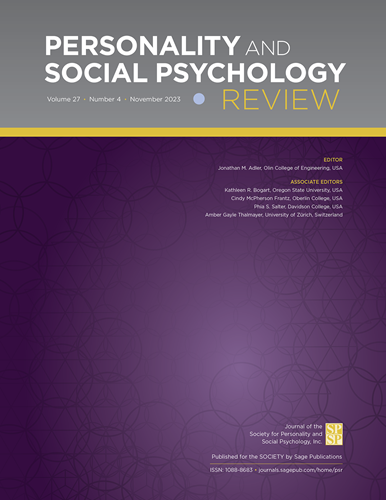Multiculturalism and Colorblindness as Threats to the Self: A Framework for Understanding Dominant and Non-Dominant Group Members’ Responses to Interethnic Ideologies
IF 10.4
1区 心理学
Q1 PSYCHOLOGY, SOCIAL
引用次数: 7
Abstract
Both multiculturalism (which involves recognizing and appreciating differences) and racial/ethnic colorblindness (which can involve emphasizing similarities or individual characteristics) are intended to promote intergroup harmony. Nevertheless, these ideologies can backfire when salient. Although this work has sometimes been interpreted to suggest that dominant group members may perceive salient multiculturalism, and non-dominant group members may perceive salient colorblindness, as threatening, it is unclear what about these interethnic ideologies poses a threat and why. The present article draws upon theories of the self-concept to introduce a framework of Multiculturalism and Colorblindness as Threats to the Self. Specifically, it is proposed that multiculturalism (colorblindness) is potentially threatening to dominant (non-dominant) group members’ collective, relational, and personal selves. Dispositional and contextual variables that may moderate perceptions of threat among members of dominant and non-dominant groups, alternative interethnic ideologies to multiculturalism and colorblindness, and potential future research directions are discussed.多元文化主义和色盲对自我的威胁:一个理解主导和非主导群体成员对种族间意识形态反应的框架
多元文化主义(包括承认和欣赏差异)和种族/民族色盲(包括强调相似性或个人特征)都旨在促进群体间的和谐。然而,这些意识形态在突出时可能适得其反。虽然这项研究有时被解释为表明,占主导地位的群体成员可能会将突出的多元文化主义视为威胁,而非占主导地位的群体成员可能会将突出的色盲视为威胁,但目前尚不清楚这些种族间的意识形态究竟是什么构成了威胁,以及为什么构成威胁。本文借鉴自我概念理论,介绍了多元文化主义和色盲对自我的威胁的框架。具体来说,多元文化主义(色盲)对主导(非主导)群体成员的集体、关系和个人自我具有潜在的威胁。本文还讨论了可能调节优势群体和非优势群体成员对威胁感知的性格和环境变量、多元文化主义和色盲的种族间意识形态替代以及潜在的未来研究方向。
本文章由计算机程序翻译,如有差异,请以英文原文为准。
求助全文
约1分钟内获得全文
求助全文
来源期刊

Personality and Social Psychology Review
PSYCHOLOGY, SOCIAL-
CiteScore
19.00
自引率
1.90%
发文量
20
期刊介绍:
Title: Personality and Social Psychology Review (PSPR)
Journal Overview:
Official journal of SPSP, the Society for Personality and Social Psychology, Inc.
Premiere outlet for original theoretical papers and conceptual review articles in all areas of personality and social psychology
Features stimulating conceptual pieces identifying new research directions and comprehensive review papers providing integrative frameworks for existing theory and research programs
Topics Covered:
Attitudes and Social Cognition: Examines the inner workings of the human mind in understanding, evaluating, and responding to the social environment
Interpersonal and Group Processes: Explores patterns of interaction and interdependence characterizing everyday human functioning
Intergroup Relations: Investigates determinants of prejudice, conflict, cooperation, and harmonious relationships between social groups
Personality and Individual Differences: Focuses on causes, assessment, structures, and processes giving rise to human variation
Biological and Cultural Influences: Studies the biological and cultural mediation of social psychological and personality processes
 求助内容:
求助内容: 应助结果提醒方式:
应助结果提醒方式:


